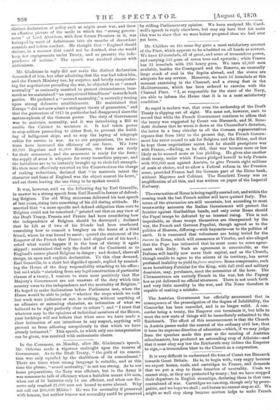Mr. Gladstone in reply did not make the distinct declaration
demanded of him, but after admitting that the war had taken him, and the French Ministry too, by surprise, and briefly recapitulat- ing the negotiations preceding the war, he objected to an "armed neutrality" as eminently unsuited to present circumstances, inas- much as we maintained" an unequivocal friendliness" towards both parties. He preferred a "secured neutrality," a neutrality resting upon strong defensive establishments. He maintained that Europe "did not now admit a stringent theory of guarantees," and that the guarantees of 1815 in particular had disappeared since the metamorphosis of the German power. The duty of Government was to maintain neutrality, and it was introducing a Bill to enable the Cabinet to maintain it. It had taken power to stop colliers proceeding to either fleet, to prevent the build- ing of belligerent ships, and to stop the laying of telegraph cables for service in war. As to our preparations, the reduc- tions have increased the efficiency of our force. We have 89,000 Regulars and 41,000 Reserves, the forts are ready for their armament, and the armament is ready for the forts ; the supply of arms is adequate for every immediate purpose, and the battalions are to be instantly brought up to their full strength. He then most effectively retorted on the Conservatives the charge of making reductions, declared that "to maintain intact the character and fame of England was the object nearest his heart," and sat down leaving the one thing to be spoken unsaid.






























 Previous page
Previous page